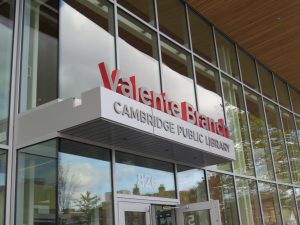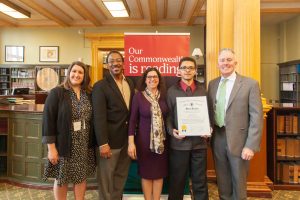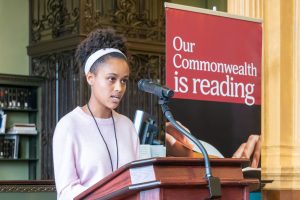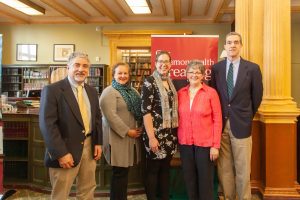
MBLC Service Update
April 1, 2020
As we work together to get through the current reality, the MBLC will provide regular updates on MBLC services and other statewide issues. Please let us know if there’s info you’d like us to cover—we’ll include it if we are able. Stay well.
State Budget
Director Lonergan has been in touch with leaders of the Library Legislative Caucus. The Governor released his budget recommendation in January. However, it is uncertain whether the House and the Senate will be able to adhere to the normal budget schedule. House Ways and Means typically releases their budget in April and Senate Ways and Means releases theirs in May. The next fiscal year begins on July 1, 2020.
The legislature remains active and have passed or are considering several bills addressing the current crisis. Passed bills include moving the tax filing deadline to July 15 and allowing municipalities to delay municipal elections.
Federal Budget
The Institute of Museum and Library Services (IMLS) announced that the President has signed the CARES Act, which designates $50 million in coronavirus response funding for IMLS. Following passage in the House of Representatives, both chambers of Congress approved of the Coronavirus Aid, Relief, and Economic Security (CARES) Act, a $2 trillion response to the growing pandemic. The IMLS press release has more information. The MBLC anticipates further guidance on how much funding Massachusetts will receive and how these funds may be used.
MBLC Monthly Board Meetings
Contact: Rachel Masse
The MBLC held an emergency board meeting, via conference call, on March 19, 2020. The Board is holding its April 2, 2020 meeting via Zoom and will continue to address board business in this way until in-person meetings are again possible. Board meetings are the first Thursday of every month.
Construction-The Massachusetts Public Library Construction Program (MPLCP)
Contact: Lauren Stara
Andrea Bunker
- There has been no further movement on the bond bill, H4154; now H4039, that contains funding for the Massachusetts Public Library Construction (MPLCP) program.
- The requirement for monthly reporting is suspended. MBLC staff will keep you posted as to when reporting will resume and what will be required.
- For active construction sites
Governor Baker’s new guidance for all public construction projects statewide requires adherence to the “safety stand down” guidelines provided to the construction industry last week. This temporary order requires a halt to public construction projects (effective 3/27/2020), and applies to all projects managed or sponsored by the state or a state agency, including the library construction projects funded through the Massachusetts Public Library Construction Program (MPLCP), while contractors review site-specific issues, develop mitigation strategies and communicate to workers about new state guidelines for construction work during the coronavirus pandemic.
Those new state rules require, among other things, all workers to self-certify before each shift that they are not sick and that certain construction workers have their temperatures taken daily. Also last week, the Governor’s chief legal counsel sent a letter (https://www.mass.gov/doc/march-25-2020-construction-guidance/download) to city and town executives with the new guidance and instructions that all construction projects should continue operations during the Governor’s state of emergency but with social distancing measures incorporated. The guidance imposes a zero tolerance policy at work sites. If a worker is sick, they are to remain home. If a worker begins to feel sick on the job, they are to go home. And if a supervisor sees a worker who appears sick, they are to send the worker home.
Please keep us updated as you are implementing the guidelines required in the Governor’s directives and let us know of difficulties or challenges you face in the implementation of those guidelines.
Contracts/Business Office
Contact: Tracey Dimant
The MBLC business office sent out the second State Aid payments last week and continues to process contracts, funding requests from affiliates, and invoices from vendors, as well as handling daily operations.
LSTA (Federal funding from the Institute of Museum and Library Services)
Contact: Lyndsay Forbes
Shelley Quezada
Rob Favini
Official statement regarding the current direct grant round
- The LSTA team is working with libraries as they get ready to submit proposals that are due April 7 , 2020
- LSTA staff are working with libraries finishing their current grants to rework their schedules due to COVID-19 disruptions.
- There is a new LSTA-funded opportunity: Scholarships to attend the ARSL small libraries conference in November. Learn more
- Shelley has been working with the Commission for the Deaf and Hard of Hearing and sent a announcement out on all regions, pubdir etc to request help in getting out information about serving this community—librarians were very responsive (no surprise, there!).
- Shelley is also been trying to keep up with what’s happening in prisons. Prison librarians are not going into the jails as it is a safety issue for them.
Networks
Contact: Paul Kissman
Kate Butler
MBLC convened a meeting with automated resource sharing network administrators and MLS last week to share current practices and planning around the pandemic. Networks discussed eBook and audio content handling and purchasing, requesting and borrowing parameters, such as changes in overdues, patron notifications, amnesty periods, and how patron-placed holds are affected. In particular networks discussed possible plans for managing the backlog of materials when libraries begin to reopen to the public and the statewide delivery system comes back online.
Preservation and Disaster Recovery
Contact: Evan Knight
MBLC Preservation Specialist Evan Knight, in collaboration with COSTEP MA board members and subscribers (“Coordinated Statewide Emergency Preparedness in Massachusetts”), has developed guidelines for response from the perspective of collections preservation. The page, “Public Health Emergencies: COVID-19,” was published March 13, and recently updated March 26 to reflect the dynamic situation. Two national organizations have recently cited the page for wider distribution: the Association for Library Collections and Technical Services, a division of the American Library Association, at “Handling Library Materials and Collections During a Pandemic,” and the American Institute for Conservation, at “Collections Care Amid COVID-19.” Thanks to Evan on this resource, which will be continuously updated, and please feel free to reach out to him with questions and concerns regarding your collections.
Evan also shares this valuable webinar from IMLS and the CDC: Mitigating COVID-19 When Managing Paper-Based, Circulating, and Other Types of Collections.
The webinar recording can be accessed here.
If you have follow-up questions for the CDC, you may submit them to imlsinfo@imls.gov.
The materials and links mentioned in the webinar have been added to the IMLS coronavirus page under “Official Government Information and Resources.”
Promotion
Contact: Celeste Bruno
Matthew Perry
Staff are using MBLC social media channels to connect users and librarians to digital resources.
The team has also created promotional posts for libraries to use on their social media channels:
Digital Library social media posts
New databases social media posts
Database promotion
The MBLC has developed database promotion for social media that takes users directly into the databases and gives the local library the usage statistic:
Databases Dogs
Databases Wellness
Databases Kids
Databases: Home Improvement
Databases Healthy Aging
State Aid To Public Libraries
Contact: Liz. Babbit
Uechi Ng
Mary Rose Quinn
- In light of the current global situation, the Board will be reviewing the State Aid policies for FY2020 on April 2. Updates will be sent to libraries, trustees, networks, etc. following the meeting.
- Second State Aid payments for FY2020 went out and Library directors will soon be getting an email with a breakdown of the total amount into LIG, MEG, and NRC amounts.
- Liz Babbitt continues to update the Public Library Closures Google Docs for both libraries and the public.
Links to the documents:
For Patrons
https://docs.google.com/spreadsheets/d/1FeAKwGWmgQqrxwFSV12bko3lgrqwp3XACbRwctFeC6w/edit?usp=sharing
For Librarians
https://docs.google.com/spreadsheets/d/1jxcw4bwx3Z0ma0MR478qIE1WfBNoIcQczKogg3JyPpI/edit?usp=sharing
Changes and updates can be submitted through our LibWizard form: https://mblc.libwizard.com/f/covid-19
Statewide digital library – libraries.state.ma.us
Contact: Kate Butler (website issues)
Matt Perry (content additions)
MBLC staff have been working to increase ease of access to digital resources. The consumer portal libraries.state.ma.us has been updated and expanded to include free-for-now resources as well as unique opportunities from authors, illustrators and educators. The resources can be seen at https://libraries.state.ma.us/pages/free-resources Always free statewide resources are also included. This one-stop place makes it easy for residents to find library resources and other free resources.
Summer/Bruins
Contact: Celeste Bruno
Rachel Masse
Matt Perry (materials and orders)
Staff has been in touch with our partners at the Boston Bruins. Many Bruins staff have been furloughed, including the staffer who works with us on the summer program. Right now , it is unclear whether Blades visits will occur this summer. Bruins summer materials have all been developed but the MBLC is holding off on orders for now. MBLC staff is working to confirm if the new for 2020 First Lady and Blades Summer Reading Challenge can still move forward. Staff has taken orders for the national CSLP poster but getting them out to the libraries is an issue due to closures.
Trustees and Friends
Contact: Maura Deedy
Rob Favini
Our Spring schedule of Trustee Orientations is currently paused in compliance with Governor Baker’s social distancing protocols. We will resume trustee orientations as soon as we can.
But in the meantime remember that Maura and Rob are available to answer any questions that you have regarding new trustee onboarding, best practices, or the latest MBLC information regarding library services during the COVID-19 pandemic.
2020 Census
Contact: Maura Deedy
Maura’s reminder: being home is the perfect time to take the census online or by telephone.
New resources that can help you get the word out: https://2020census.gov/en/how-to-help.html?utm_campaign=20200330msc20s1ccallrs&utm_medium=email&utm_source=govdelivery
MBLC LibGuide: https://guides.mblc.state.ma.us/census
 Sustainable construction is an essential component in the fight to mitigate climate change. While the Massachusetts Public Library Construction Program (MPLCP) has funded a Leadership in Energy and Environmental Design (LEED) incentive since 2008, code has evolved and sustainability measures have become more common practice. Materials, technology, and costs continue to improve and propel green building forward with products and systems that offer smarter, more efficient solutions.
Sustainable construction is an essential component in the fight to mitigate climate change. While the Massachusetts Public Library Construction Program (MPLCP) has funded a Leadership in Energy and Environmental Design (LEED) incentive since 2008, code has evolved and sustainability measures have become more common practice. Materials, technology, and costs continue to improve and propel green building forward with products and systems that offer smarter, more efficient solutions.

